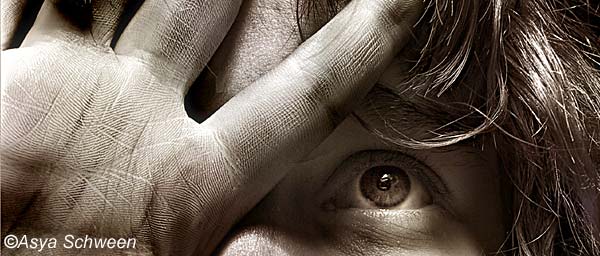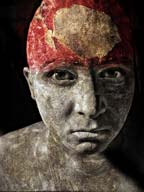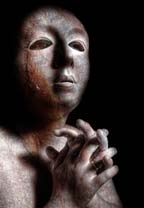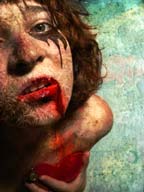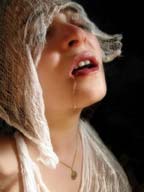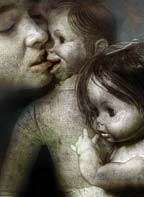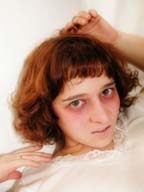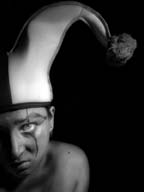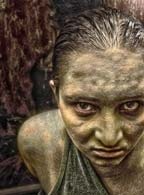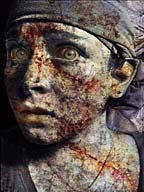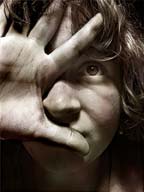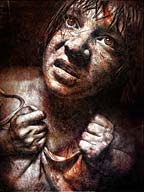Larry and Chris: Tell us a little about yourself.
Asya: I'm an ambidextrous, color-blind math grad student, 22. I
have two master degrees and I'm two years away from my Ph.D. in
Bioinformatics. From time to time I want to ditch my college and do
photography but I'm afraid I appear to be a coward and of course such
attitude doesn't lead to anything except mediocrity, to be generous.
Therefore my photos are being used exclusively in a utilitarian fashion
for my own hedonistic fulfillment only.
My self-portraits are not ordained by my desire to impose something
upon them. I'm not an admirer/devotee/pretender of dark glamour and morbid
beauty. I'm continuously producing self-portraits and sometimes
disgust/terrified/upset with them myself. I do self-portraits just for fun
in attempt to escape the boredom of mathematics, so I sometimes spend
hours and hours to set up just one shot.
Larry and Chris: How and when did you become interested in
photography?
Asya: I was indifferent to photography for a long time as I
never liked family albums. To me, family albums were (and still are) the
quintessence of life’s superficiality. My 35mm point-n-shoot camera is
still somewhere in my drawers, gathering dust. Two years ago I’ve got my
first digital camera, Canon PowerShot G1, as a not-so-thrilling but quite
expensive gift. I quickly became enamored with the digital ease-of-use and
opportunity of making refinements on the fly. However, I was still
apathetic to the dull nondescript scenic shots and faceless group
portraits. A drastic change in my life happened a couple months later,
I’ll tell you more about that later.
Larry and Chris: Have you ever taken a course in photography, or
are you totally self-taught?
Asya: When I was 11, I fell in love for the first time, with my
classmate. I joined a photo club just to be close to him. Three months
later I began attending another school, forgot my first all-in-all and
that was the end of my proper education in photography.
Larry and Chris: What were your earliest photographs like?
Asya: In a word, inexpressive. They all failed to convey my
emotions, the transcendent fundamentals of the objects I was shooting,
well enough. For example, my visit last year to San Francisco stunned my
senses; the city itself reminded me of Dostoevsky's Petersburg - dark and
obscure, but magnetic and intellectual. The photographs, however, turned
out dull and insipid.
Larry and Chris: Can you tell us a bit about your childhood,
especially any nurturing of artistic talent?
Asya: Nurturing of artistic talent? I was born in the family of
young engineers; I am the second child, second daughter. My dad secretly,
but desperately, wanted a boy, so I was raised as a tomboy, climbing
trees, scraping knees and stealing ammonium nitrate from neighbor’s
garage. My parents were strict and unrelenting disciplinarians. Pretense
and artificiality of emotions were disapproved and always derided. I was
sent to advanced school with emphasis on physics and mathematics, later I
got my bachelor’s degree in Physics (just like my dad) and was accepted to
an applied math graduate program here in the U.S.
Larry and Chris: When did you begin the series of
self-portraits, and how did this come about?
Asya: I was shooting an abandoned piano in the back yard of my
apartment complex; it was just another vain endeavor to
express/communicate my thoughts and feelings. In a burst of irritation I
swiveled the LCD screen all the way around and took a photo of my
aggrieved face and was unexpectedly pleased with the result. I clearly
remember my mounting excitement as I rushed home and started taking photos
of my dissatisfied facial expression.
Larry and Chris: Have you done any acting? Do you do any
creative writing or poetry?
Asya: Oh, no! To be honest, I’m not really into opera, ballet or
even figure skating. I hesitate to step up to the soapbox and I do not
think I have any acting vibes.
Larry and Chris: What is your definition of beauty?
Asya: To me, beauty is a quantum number that accounts for the
existence and lifetime of the upsilon particle. That’s the definition I’ve
learned in engineering school and I do not really treasure the
metaphysical one. I believe neither in absolute beauty nor in a moral or
aesthetical one. If pressed, I would define this term from gastronomical
viewpoint of being inexplicably attracted to an object, reveling in it,
but not as a universal measure of human taste.
Larry and Chris: What do you get most excited or passionate
about?
Asya: I guess I’ve become a dreary mathematician, but I fail to
come up with anything not utilitarian that would get me excited or
passionate.
Larry and Chris: What turns you off the most?
Asya: Discussing anything that is beyond what is perceptible to
the senses. This relates to the old habit of ignoring pseudoscientific
hypotheses and lofty engineering plans. I dislike discussing fine art,
archetypal ideals, etc.
Larry and Chris: What are your future plans, and how definite
are you about them?
Asya: I’m now 22, I’m planning to finish my Ph.D. studies in a
year or two. I’m trying to recall what else I promised to my mom and I
hope I never ever mentioned Fields Medal in mathematics to her, as it
would make me head for this unfeasible award as well. My parents do not
want to hear anything about photography and I myself realize that being an
ever-lasting amateur would continue to delude me that I’m not a mediocre
scientist but a might-have-been professional fine art photographer. I have
a glorious, promising, challenging, as well as splendid, magnificent and
delightful professional future of applied mathematician.
Larry and Chris: Would you like to make a living from your art?
Asya: Yes, if it doesn’t imply working solely for mercenary
reasons.
Larry and Chris: What do you like to do when you're not creating
images or attending to your studies?
Asya: I enjoy reading. I’m not well-read when it comes to
discussing/describing the literature; I’m a silent Greek sea sponge that
thankfully imbibes the literary moisture without any transcendental
argumentation.
Larry and Chris: What is bioinformatics and what drew you to it?
Asya: Math turned out to be mind-numbingly boring, so I turned
to a very applied and relatively boisterous area of applied math,
bioinformatics. The area of bioinformatics, in particular, computational
biology, has captivated me because of the vast spectrum of research
opportunities it offers in the analysis and interpretation of genomic
data. I find this area exciting, rewarding, and most of all, fun. However,
it would be an unwary exaggeration to tell that ‘I found myself’ in this
field.
Larry and Chris: At first glance, your interest in a branch of
mathematics seems at odds with your images. Is this just another side of
you, or are the two related in any way?
Asya: I truly enjoy this question as it ingratiatingly pictures
me as a polyhedral semiprecious crystal with mathematics being a ‘just
another side’ of my otherwise perfect shape. I spent seven years playing
violin while being 100% tone-deaf, I enjoy painting and photography while
being partially colorblind, I study physics and mathematics all my life
while being apathetic to exact sciences. So yes, at first glance, most of
my interests seem odd, but they probably make me the person I am.
Larry and Chris: When and why did you decide to come to the US?
Asya: Norman Brenner once said, “The intermediate stage between
socialism and capitalism is alcoholism.” I was the ill-fated witness of
the moral decay of my coevals during the years of undergraduate studies in
one of the best Russian engineering schools. After graduation, I had no
ideas about my future plans and occupation, so I decided to postpone
making these decisions until I’m done with the graduate school.
Larry and Chris: What kinds of equipment are you using, both
photographic and otherwise?
Asya: I have two digital cameras – Canon PowerShot G1 and Nikon
CoolPix 5700, I also have Zenith AM, Polaroid Sx-70 and an antique folding
Kodak camera. I’m happy with my three 500 Watt heavy-duty garage lamps,
half a dozen of flashlights and home-made soft boxes. I bought $10 fabric
for my background and I’m also a proud owner of several 58mm filters. I
also have Epson Stylus Color 777 printer, 2.53 GHz P4 computer and 19”
ViewSonic monitor.
Larry and Chris: What about the props used in your pictures.
Your images, though simple in composition, are well thought out complex
statements.
Asya: Props! Oh yeah, props! Last week I caught myself buying
useless stuff to make one shot and then throw it away. I'm renting a tiny
studio (as in "studio apartment", not "the working place of a painter,
sculptor, or photographer ") in South Central, LA and my room and
kitchenette are cluttered with IKEA storage boxes, canvas supplies and
mathematical textbooks.
Larry and Chris: What camera equipment did you use when you
lived in Russia?
Asya: None myself. However, my dad used to take pictures, so we
had a mini lab at home; I was first initiated in the enigmatic rite of
printing black-and-white photos at age six.
Larry and Chris: How much time do you spend making your images?
Asya: All of my spare time is absorbed by taking and processing
pictures.
Larry and Chris: How has your use of digital cameras affected
your self-portraits?
Asya: It’s probably the other way around, my self-portraits has
affected the use of the camera
Larry and Chris: Do you view the LCD screen before you trip the
shutter?
Asya: Not anymore. When I first started, I always monitored the
final composition in my PowerShot swivel LCD screen, now I find a certain
pleasure in making ‘blind’ portraits and most of my recent work is done
this way.
Larry and Chris: We’ve seen many of your pictures posted to
forum threads on dpreview. Are the images accompanying your posts on the
dpreview forum pulled from your files or done on the spot?
Asya: Few of them were done immediately after reading the forum,
the rest were pulled from my collection.
Larry and Chris: How much post-exposure manipulation is used in
creating your images? To what degree are your images pre-visualized?
Asya: Most of the times, I’m trying to catch a certain
expression/frame of mind, so I already keep a deliberate and
well-visualized image in my head. Very often I have to post-process the
resulting image in order to perfect the final mood.
Larry and Chris: How do you feel about the attention being paid
to your work?
Asya: Obviously it is one of the most contradictory feelings
I’ve ever experienced before, the one that is worth catching in a pile of
bytes on my hard drive. I once compared this sensation to the feelings of
‘lusus naturae’ from the cabinet of curiosities, but obviously there’s
more than that.
Larry and Chris: How important to you is the effect that your
images have on others, or that they have any effect at all?
Asya: Apparently, my collection is more than a family album that
I’ve mentioned above, so public exposure does not leave me passionless. At
the same time, each of my self-portraits is an end product, stark fossil
that I thoroughly collect for unknown reasons as an inveterate philatelist
or numismatist. Overall, I feel a presence of thick glass that separates
me from the visitors and lets me study the reaction from the distance.
Larry and Chris: Some of your portraits have a strong erotic or
sexual undertone. Can you speak about that?
Asya: Again, I’m not good with definitions; to me, virtually any
object can be strongly marked or affected by sexual desire. It is neither
bad nor good; it is a private measure of your own visual perception. Yes,
I sometimes intend to enclose a sexual impact in my portraits but it is
never meant to be indecent or vulgar.
Larry and Chris: What artists and photographers do you admire,
and how may you have been influenced or inspired by them?
Asya: I enjoy a healthy view of life of Jean-Baptiste Mondino
and somewhat repulsively attracted to the work of Joel-Peter Witkin.
Larry and Chris: Your work is a bit reminiscent of Cindy
Sherman's. Are you familiar with her images?
Asya: I found out about Cindy Sherman’s work recently, a friend
accused me of direct replication of her work. However, I believe our works
differ a lot. I see her art as a series of cinematographic tableaux that
refer to intentionally generalized and abstract anonymous female roles in
modern society. Her self-portraits deliberately lack authentic human
emotions, while mine scream for the presence of those.
Larry and Chris: You summarize the essence of Cindy Sherman's
work with a remarkable clarity. Reaching out to all media, in all time
periods, what artists, musicians, and other creative people can you point
to who have truly captured the powerful emotions you seek to portray in
your photographs? Have you ever studied their approaches to the creative
process?
Asya: Here’s an incomplete list without any order or
forethought: painter, sculptor, architect Michelangelo Buonarroti,
violinist and composer Niccolò Paganini, depressive lyrical monologues of
German gothic group “Sopor Aeternus”, modern Brazil artist Adriana Varejão,
impressionist painter Vincent van Gogh, Russian poet Feodor Tyutchev, most
of German expressionists (E. L. Kirchner, Käthe Kollwitz, and George Grosz).
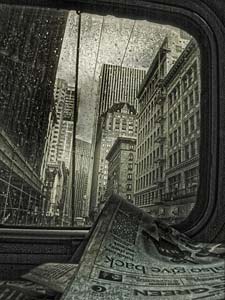
Larry and Chris: You speak of how a visit to San Francisco
strongly affected you, and how disappointed you were with the results of
your photographs. Actually the image you sent was quite powerful, and
unique in terms of any other shot of San Francisco we've seen. Capturing
the "transcendent fundamentals of the objects" in a photograph is a very
difficult task. How do you approach it? Do you previsualize an image that
has that energy in it, or do you seek it on your camera's LCD? And how do
you know you have captured it when you are finished with an image? How
does the reaction of others to the finished piece enter into the equation?
Asya: I guess, still photography in general would fail to
transmit my San Francisco sensation during that visit – it should be a
repetitious, grotesque, almost absurd series of vignettes that closely
resemble grainy silent movie.
Have you ever tried to pin down a butterfly for a collection of insects
in your childhood? Well, I was a young entomologist once… Still remember
not being able to shake off the stupor while pinning, spreading and
mounting a beautiful but dead creature on the display. To me, shooting is
a similar rite, but the "transcendent fundamentals of the objects" are
still alive when you ‘mount’ them and that’s what makes the whole
capturing problem so uneasy. Camera is not the decisive element in finding
the image; it is a wayward tool of seizing it.
I do not remember ever being happy with the resulting images.
Self-portraits do not frustrate me that much – most of the time I’m still
able to relate my facial expressions to the naturally many-sided essence
of my (and everyone’s) being. Honestly, from time to time I’m giving up on
capturing inanimate objects, the process starts reminding me of
spiritualism - sitting around a table, holding hands and communicating
with the reticent lifeless surroundings. In general, photography
challenges me constantly - intellectually, and emotionally.
My parents taught me to see myself through the reaction of others, but
I guess I neither accepted nor followed this instruction. I keep a
vigilant watch over the vastly differing perception of my work by others,
the way public opinion fluctuates and alters as I introduce a new image,
but most of the time I find it sarcastically entertaining rather than
informative or instructive.
Larry and Chris: You have a very empirical approach to esthetic
issues. Is there any room for the metaphysical or unexplainable in your
creative process? Can the spirit of a time and place be crystallized by a
photograph?
Asya: Of course there’s plenty of metaphysical or unexplainable
content in my work/life. However, chewing over these subjects seems to be
a mauvais ton to me.

